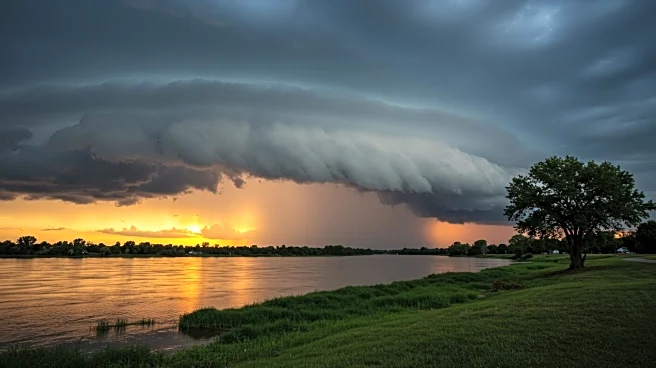What's Happening?
A flash flood has tragically swept through a campsite in north China, resulting in the deaths of eight individuals and leaving four others missing. The incident occurred in the Urad Rear Banner, a mountainous region in the Inner Mongolia Autonomous area, known for its popular camping sites. The flood struck around 10 p.m. local time on Saturday, as reported by Chinese state media. Initially, thirteen campers were reported missing, but by Sunday morning, one person had been rescued and eight bodies were recovered. Search and rescue operations are ongoing for the remaining missing individuals. This event is part of a series of recent flash floods and landslides affecting northern China, including a previous incident in Gansu province that resulted in at least ten deaths and 33 missing persons. Heavy rains have also impacted other regions, such as Hong Kong, which has experienced historic downpours.
Why It's Important?
The flash flood in north China underscores the increasing frequency and severity of natural disasters in the region, likely exacerbated by climate change. Such events pose significant challenges to emergency response systems and highlight the vulnerability of popular tourist areas to sudden weather changes. The loss of life and ongoing search efforts emphasize the urgent need for improved disaster preparedness and infrastructure resilience. This incident also draws attention to the broader implications of climate-related disasters on public safety, economic stability, and environmental sustainability. As these events become more common, they could have far-reaching impacts on regional development and international cooperation in disaster management.
What's Next?
Rescue teams continue to search for the missing individuals, with efforts likely to intensify as authorities aim to prevent further casualties. The Chinese government may consider implementing stricter safety regulations and early warning systems for camping and outdoor activities in vulnerable areas. Additionally, there could be increased investment in infrastructure to mitigate the effects of future floods. The international community may also engage in discussions on climate adaptation strategies to address the growing threat of extreme weather events.
Beyond the Headlines
The incident highlights the ethical and environmental considerations of human activities in ecologically sensitive areas. It raises questions about the balance between tourism development and environmental conservation, as well as the responsibility of governments and businesses to ensure the safety of visitors. Long-term, this could lead to a reevaluation of land use policies and greater emphasis on sustainable tourism practices.









